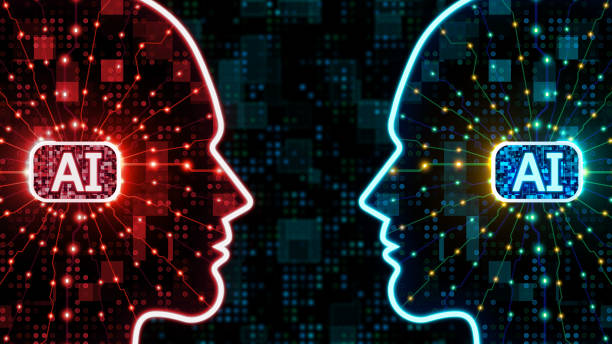A Comprehensive Introduction to Artificial Intelligence

In today’s rapidly advancing world, #Artificial_Intelligence emerges as one of the most powerful and influential technologies.
This field, also known as machine intelligence, strives to enable machines and computer systems to perform tasks that typically require human intelligence.
From natural language understanding to pattern recognition and decision-making, the scope of AI’s capabilities seems boundless.
The history of this science dates back to the 1950s, when scientists first proposed the idea of creating machines with the ability to think.
Since then, with massive advancements in processing power and access to big data, artificial intelligence has transformed from a science fiction concept into a tangible reality.
This chapter provides a deep and comprehensive explanation of what AI is and why it holds such high importance in this modern era.
The purpose of this section is purely explanatory, laying the foundation for understanding subsequent topics.
Artificial intelligence not only enables process optimization but also opens new doors for innovation and discovery.
Our discussion around artificial intelligence and its capabilities is the beginning of a journey to understand the world transformed by this technology.
A basic understanding of AI is essential for anyone who wants to grasp the current technological transformations.
Did you know that customers’ first impression of your company is your website? With a powerful corporate website from Rasaweb, multiply your business’s credibility!
✅ Custom and eye-catching design tailored to your brand
✅ Improved user experience and increased customer attraction
⚡ Get a free consultation!
Key Pillars and Concepts of Artificial Intelligence

To gain a deeper understanding of artificial intelligence, it is essential to know its key pillars and concepts.
At the heart of artificial intelligence lie concepts such as Machine Learning and Deep Learning.
Machine learning enables algorithms to learn from data and identify patterns without being explicitly programmed.
Meanwhile, deep learning is a subset of machine learning that uses artificial neural networks with multiple layers to model more complex processes and extract high-level features from data.
This section is entirely specialized and delves into the technical aspects of artificial intelligence.
Furthermore, Natural Language Processing (NLP) allows machines to understand, interpret, and generate human language, while Computer Vision empowers intelligent systems to see and interpret images and videos.
These are just some of the areas in which artificial intelligence is evolving.
Understanding these fundamental concepts is crucial for anyone seeking to delve deeper into the world of machine intelligence.
These explanations serve as an explanatory section to familiarize the reader with the primary terminology and techniques used in developing AI systems.
Widespread Applications of Artificial Intelligence in Daily Life

Artificial intelligence, which goes by various names and is sometimes simply known as AI, is no longer confined to science fiction films; rather, it is deeply woven into our daily lives.
From content recommendation systems on movie and music streaming platforms to smart voice assistants like Siri and Alexa, the footprint of this technology is visible in every corner of our world.
In the medical field, AI assists in diagnosing diseases and helps doctors choose the best treatment methods.
In the automotive industry, the development of self-driving cars is one of the most exciting yet challenging applications of AI.
This section of the article is designed with educational and entertaining objectives to familiarize readers with tangible and understandable examples of AI applications and demonstrate how this technology improves our lives.
Even in banking systems, AI is used to identify suspicious transactions and prevent fraud.
Artificial intelligence not only increases efficiency but can also incredibly enhance user experience.
Below, a table is presented that briefly shows the main types of AI and their applications:
| Type of AI | Brief Description | Common Applications |
|---|---|---|
| Narrow AI (ANI) | Specialized in a specific task | Voice assistants, recommendation systems, facial recognition |
| Artificial General Intelligence (AGI) | Ability to perform any intellectual human task (still under development) | Theoretical concepts, long-term research goal |
| Artificial Superintelligence (ASI) | Surpassing human intelligence in all fields (beyond AGI) | Futuristic and science fiction concepts |
This table helps in better understanding how AI is categorized and its applications, providing an explanatory view of the technology’s potential.
The Role of Artificial Intelligence in Industrial Transformation
![]()
Artificial intelligence, as a powerful catalyst, is transforming various industries worldwide.
From manufacturing to agriculture, and from transportation to the energy sector, AI has increased efficiencies, reduced costs, and opened new pathways for innovation.
In the manufacturing sector, smart robots and AI-based automation systems have optimized production lines, significantly increasing accuracy and speed.
This leads to increased production and reduced waste.
In agriculture, the use of AI for soil data analysis, weather pattern prediction, and even monitoring plant health through satellite imagery and drones helps farmers make better decisions and improve productivity.
These widespread changes demonstrate AI’s immense potential in creating fundamental transformations.
The transportation industry is also a pioneer in utilizing artificial intelligence.
From optimizing routes to reduce traffic and fuel consumption to developing autonomous driving systems that enhance road safety.
In the energy sector, AI assists in smart grid management, demand forecasting, and optimizing energy consumption, all moving towards greater sustainability and reduced environmental impact.
These developments are not only news of significant progress but also have an analytical aspect, showing how artificial intelligence is redefining the rules of the game in global markets.
This technology allows companies to gain deep insights by collecting and analyzing countless data points, which was previously impossible.
Losing customers because of your outdated appearance or slow e-commerce website bothers you? Rasaweb’s expert team solves these problems with professional e-commerce website design!
✅ Increase customer trust and brand credibility
✅ Blazing speed and excellent user experience
Get a free consultation with Rasaweb right now ⚡
Challenges and Ethical Considerations of Artificial Intelligence

Despite the unparalleled potential of artificial intelligence, a set of challenges and ethical considerations also arise that require careful examination.
One of the most important issues is the discussion of bias in data and algorithms.
If the data used to train an AI system is biased (e.g., not adequately representative of certain groups of people), the AI’s output can also be unfair or discriminatory.
This issue creates a questionable content regarding how artificial intelligence can be developed ethically and fairly.
Data privacy, cybersecurity, and the transparency of AI decision-making are also fundamental concerns.
How can we ensure that our personal data is properly protected, or how can we design AI algorithms so that their decisions are understandable and justifiable? The discussion of job displacement by AI is also a hot and concerning topic that affects the future of the workforce and requires strategic planning from governments and companies.
These discussions have deep analytical aspects that go beyond the technical facets of AI and encompass its social and economic dimensions.
Sustainable and responsible AI development requires extensive cooperation among technologists, policymakers, sociologists, and the general public to ensure that this technology is used for the benefit of all humanity.
Artificial intelligence, alongside its opportunities, also brings responsibilities.
The Future of Artificial Intelligence and Upcoming Innovations

The future of artificial intelligence is full of innovations and advancements that can push current boundaries and change the world in unimaginable ways.
One of the hottest discussions in this field is the concept of Artificial General Intelligence (AGI), which refers to a system capable of learning and performing any intellectual task that a human can.
This contrasts with Narrow AI (ANI), which currently dominates our world and excels only in specific tasks.
Achieving AGI could bring about a massive revolution in all aspects of human life.
Furthermore, the development of Generative AI, capable of creating new content such as text, images, music, and video, is another exciting area.
This technology not only assists artists and designers but can also fundamentally transform how we produce content and interact with information.
The convergence of AI with other technologies such as the Internet of Things (IoT), cloud computing, and biotechnology also opens new avenues for applications and innovations.
This section provides news and specialized information about future trends and advanced research in the field of artificial intelligence, offering an analytical perspective on how this technology can shape our future.
Artificial Intelligence and Our Lifestyle

The impact of artificial intelligence on our daily lifestyle goes beyond what many of us imagine.
From personalizing online experiences to improving health and education, this technology has bestowed countless opportunities upon AI to enhance our quality of life.
In the realm of entertainment, AI algorithms learn our tastes and suggest appropriate content, whether it’s movies, music, or video games.
This personalization transforms the user experience into a more entertaining and engaging one.
In education, AI-based tools can personalize learning paths for each student, identify strengths and weaknesses, and provide educational content tailored to individual needs.
Even in social interactions, we witness the presence of artificial intelligence.
Intelligent chatbots are employed in customer service, social platforms, and even for mental health support.
These applications demonstrate how machine intelligence can facilitate our communications and improve access to information and services.
The table below briefly outlines some of these impacts:
| Aspect of Life | How AI Impacts | Examples |
|---|---|---|
| Entertainment | Content and user experience personalization | Movie recommendation systems (Netflix), music playlists (Spotify) |
| Education | Personalized learning and intelligent resources | Online learning platforms, automated grading tools |
| Health | Disease diagnosis, personalized care, smart drugs | Heart rate monitoring, surgical robots, drug discovery |
| Home Security | Surveillance systems and smart homes | Security cameras with motion detection, smart thermostats |
This table provides an explanatory and comprehensive overview of AI’s presence in various aspects of daily life and emphasizes its role in improving quality of life.
Learning and Development Path in Artificial Intelligence

For those interested in entering the exciting world of artificial intelligence, there is a clear path for learning and development.
This path, focusing on theoretical and practical knowledge, provides unparalleled opportunities for innovation and advancement.
The first step is mastering fundamental mathematical concepts, including statistics, linear algebra, and calculus, which form the backbone of AI algorithms.
After that, familiarity with programming languages like Python and its specialized libraries such as TensorFlow and PyTorch is essential.
Numerous educational resources are available, from online courses and MOOCs (like Coursera, edX) to reputable universities and institutions.
Specialized courses in machine learning, deep learning, and natural language processing can provide the necessary skills for working with artificial intelligence.
Practical experience through projects, participation in programming competitions, and collaboration with the developer community are also crucial for strengthening knowledge and skills.
This section serves as a comprehensive guide for those interested in the field of artificial intelligence and shows how they can grow in this area.
Soft skills such as critical thinking, problem-solving, and creativity are also highly important alongside technical skills.
Losing potential customers due to an unprofessional website? Rasaweb is your answer! With our specialized corporate website design services:
✅ Elevate your business’s credibility and standing
✅ Experience attracting more targeted customers
⚡ Act now to get a free consultation!
Economy and Society in the Age of Artificial Intelligence

The widespread integration of artificial intelligence into various aspects of life has had profound impacts on the economy and the social structure of societies.
On one hand, artificial intelligence can lead to increased productivity, the creation of new industries, and economic growth.
Companies that effectively utilize AI can gain a significant competitive advantage and conquer new markets.
This technology can optimize complex processes and facilitate data-driven decision-making, all contributing to greater profitability.
On the other hand, there are concerns about the impact of artificial intelligence on employment and wealth distribution.
While new jobs are created in AI-related fields, some routine and repetitive jobs may be replaced by automated systems.
This issue creates a questionable content regarding the future of the workforce and highlights the need for investment in retraining and upskilling.
Equity in access to technology and preventing the rise of social inequalities are also significant challenges that society faces in the age of AI.
This section provides a precise analysis of the economic and social opportunities and threats arising from the expansion of artificial intelligence.
Furthermore, the role of governments in formulating policies that support the workforce and ensure the equitable distribution of AI’s benefits is crucial.
Conclusion and A Look at the New Horizons of Artificial Intelligence

Throughout this article, we have comprehensively examined artificial intelligence, from its fundamental concepts and widespread applications to its challenges, ethical considerations, and learning paths.
It is clear that artificial intelligence is not just a technology, but a transformative force that is redefining the world around us.
This technology holds unparalleled potential to solve some of humanity’s greatest problems, from diseases and climate change to improving quality of life and facilitating access to information.
However, as we have seen, this immense power also comes with great responsibilities.
Responsible and ethical development of artificial intelligence, ensuring fairness and transparency, and preparing societies for upcoming changes are among the vital tasks ahead of us.
The future of artificial intelligence is one filled with unlimited potential, but achieving this potential requires global cooperation, continuous innovation, and a thoughtful approach to challenges.
This section serves as an explanatory summary of all topics discussed and, looking at the new horizons of artificial intelligence, emphasizes the importance of continued research and responsible development in this field.
This journey into the world of artificial intelligence has just begun and is accompanied by new discoveries every day.
Frequently Asked Questions
| Question | Answer |
|---|---|
| What is Artificial Intelligence? | It is the simulation of human intelligence in machines programmed to think like humans and mimic their actions. |
| What are the main branches of Artificial Intelligence? | They include machine learning, deep learning, natural language processing, computer vision, and robotics. |
| What is Machine Learning? | It is a branch of artificial intelligence that focuses on enabling systems to learn from data and identify patterns without explicit programming. |
| Mention examples of AI applications in our daily lives. | Voice assistants (like Siri and Alexa), recommendation systems in Netflix and Amazon, self-driving cars, and facial recognition programs. |
| What is Deep Learning? | It is a subset of machine learning that uses multi-layered (deep) artificial neural networks to process large amounts of data. |
| What is Natural Language Processing (NLP)? | It is a branch of artificial intelligence that focuses on enabling computers to understand, interpret, and generate human language. |
| What are some ethical concerns related to Artificial Intelligence? | These include data bias, privacy, job loss, and accountability in case of errors. |
| What are the main benefits of Artificial Intelligence? | Increased efficiency, improved decision-making, automation of repetitive tasks, and discovery of complex patterns in data. |
| How is Artificial Intelligence used in healthcare? | In disease diagnosis, drug discovery, medical image analysis, and personalized patient care. |
| How do you see the future of Artificial Intelligence? | It is expected to continue evolving rapidly, impacting all aspects of human life, from industry to education and entertainment. |
And other services of Rasaweb Advertising Agency in the field of advertising
Smart Marketing Automation: A fast and efficient solution for improving SEO ranking with a focus on marketing automation.
Smart Sales Automation: An innovative platform for improving click-through rates by optimizing key pages.
Smart Digital Branding: An effective tool for increasing website traffic by utilizing real data.
Smart SEO: A fast and efficient solution for online growth with a focus on using real data.
Smart Conversion Rate Optimization: A specialized service for increasing website traffic based on custom programming.
And over hundreds of other services in the field of online advertising, advertising consultation, and organizational solutions
Online Advertising | Advertising Strategy | Advertorial
Sources
AI Opportunities in Iran AI Challenges and the Future of Work Impact of AI on the Economy AI Ethics and Society
? With Rasaweb Afarin, your business gets a new lease on life in the digital world. With expertise in secure website design, search engine optimization (SEO), and online advertising campaign management, we are with you on the path to success.
📍 Tehran, Mirdamad Street, next to Bank Markazi, Southern Kazeroon Alley, Ramin Alley, No. 6




